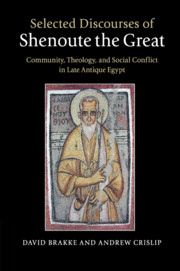 Selected Discourses of Shenoute the Great
Selected Discourses of Shenoute the Great Book contents
- Frontmatter
- Dedication
- Contents
- List of maps
- List of figures
- Acknowledgments
- Maps
- Introduction: Shenoute's life, times, and Discourses
- Part I Heretics and Other Enemies of the Church
- Part II Shenoute as Pastor and Preacher
- Part III The Christian's Struggle with Satan
- Part IV The Conflict with Gesios
- 18 Not because a fox barks
- 19 Let our eyes
- 20 A26
- 21 God says through those who are his
- 22 God is blessed
- Bibliography
- Index of names
- Index of subjects
- Index of biblical passages
21 - God says through those who are his
from Part IV - The Conflict with Gesios
Published online by Cambridge University Press: 05 December 2015
- Frontmatter
- Dedication
- Contents
- List of maps
- List of figures
- Acknowledgments
- Maps
- Introduction: Shenoute's life, times, and Discourses
- Part I Heretics and Other Enemies of the Church
- Part II Shenoute as Pastor and Preacher
- Part III The Christian's Struggle with Satan
- Part IV The Conflict with Gesios
- 18 Not because a fox barks
- 19 Let our eyes
- 20 A26
- 21 God says through those who are his
- 22 God is blessed
- Bibliography
- Index of names
- Index of subjects
- Index of biblical passages
Summary
An instruction that he delivered one day when he saw the adherents of the man deserving to be cursed (Gesios), when he wanted them to tell him (Gesios) about what he (Shenoute) often said about him, and he wanted the others to guard themselves against that man's activities.
Relations between pagans and Christians
God says through those who are his, “Children shall not be put to death for fathers,” and, “It shall not be the case that the fathers eat sour grapes, and the children's teeth are set on edge.” So too believing slaves will not die for unbelieving masters, nor will the impieties of godless masters, who worship “wood and stone,” count against slaves whose hope is in God and his Christ Jesus. The negligence of unbelieving and abusive masters will be on them, and the righteousness of believing slaves will be on them. Where we'll go there is no slavery for those who free themselves now from slavery to sin.
Therefore, inasmuch as each person will give account of himself to God, pay heed to what is written, “Depart! Depart! Do not touch what is unclean!” Do not have fellowship with the works of those who are slaves of Kronos, who love and are mad for Hecate, who gaze at the lewd image, lest the one who hates those people, Jesus, hate you and them. And the holy writing has said that the angels told Lot to leave Sodom quickly, sparing him, lest he be destroyed with them. Now it's being said to you too, O man, through the word of God, and you should withdraw from their sins, lest he make you like them and obliterate you with them.
There's pointless folly for those who descend to it, that is, when people of our kind, although they say, “We love the one who gave us knowledge, Christ,” accept any gift at all from godless people or when we give gifts to them so as to acquire friendship with the enemies of Christ. They are manifest to our people and many people as idolaters who worship the demonic idols and say in their audacity, “Just as we cannot convert you to being pagan, you cannot convert us to being Christian.”
- Type
- Chapter
- Information
- Selected Discourses of Shenoute the GreatCommunity, Theology, and Social Conflict in Late Antique Egypt, pp. 266 - 277Publisher: Cambridge University PressPrint publication year: 2015


